The idea for a coast-to-coast scooter rally was conceived in the early 2000s by Mike Heytens at the Gold Spike scooter rally in Las Vegas, Nevada. According to Heytens, the first event was held “because people said you could not kit a vintage Vespa and make it reliable, so I was out to prove them wrong.” Since most scooters’ top speed makes it difficult to get into serious trouble with law enforcement, the format seemed ideal. Over several years preceding the first event, over 30 scooter riders committed to making the cross country trip.
On the morning of September 12, 2004, nine riders departed Virginia Beach, Virginia on a 12-day rally to NoHo Scooters in North Hollywood, California. The paper route maps, generated using Microsoft Streets and Trips, contained errors and dated guidance on road closures, detours, and alternatives. The scoring format was simple: the rider with the quickest time between the starting and ending hotel each day was the winner. The 2004 Cannonball was won by JD Merryweather of Oklahoma City, Oklahoma.
Related
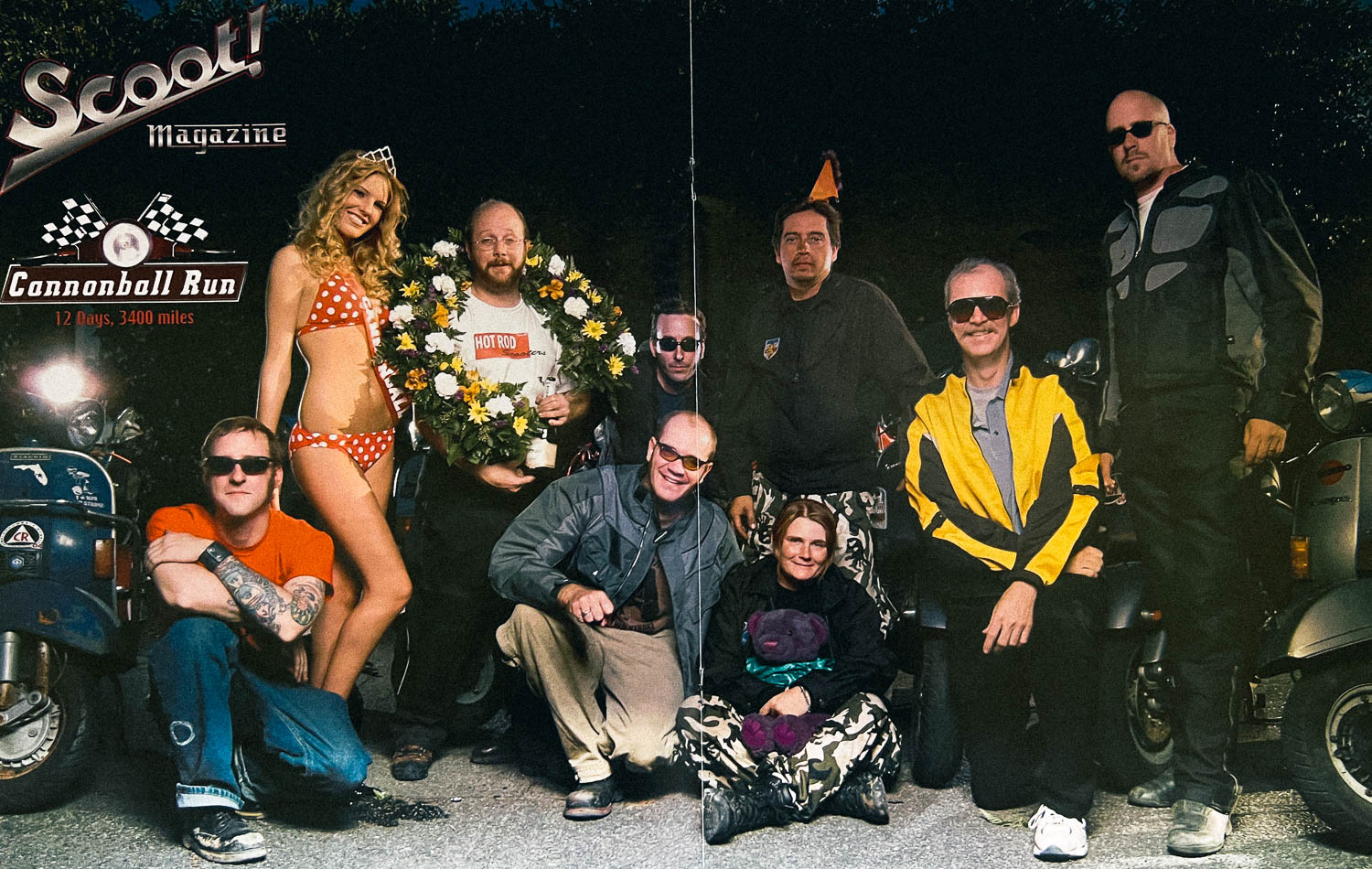

The Scooter Cannonball became a recurring event, with a new route chosen for the next rally. The second Scooter Cannonball began on September 10, 2006, in Pacific City, Oregon and finished 9 days later in Orange, New Jersey. The route was estimated to be 3,293 miles, and riders were divided into four scoring classifications based on their scooter. The new scoring classes were Automatic Super Stock, Automatic Stock Kitted, Manual Stock, and Manual Kitted.
A time-distance, regularity rally scoring format was adopted in 2006. A total of 34 riders participated in the 2006 Scooter Cannonball, and there was equal participation between vintage scooters and modern scooters. Overnight locations included John Day, Oregon; Hailey, Idaho; Dubois, Wyoming; Valentine, Nebraska; Ames, Iowa; Merrillville, Indiana; Cleveland, Ohio; and Warren, Pennsylvania.
Stan Obal was the overall winner in the Automatic Super Stock class with 231 points. Owen Medd won the Automatic Kitted with 137 points. Janice Ashrat won the Manual Stock class with 119 points. Patrick Owens won the Manual Kitted class with 126 points.
Related
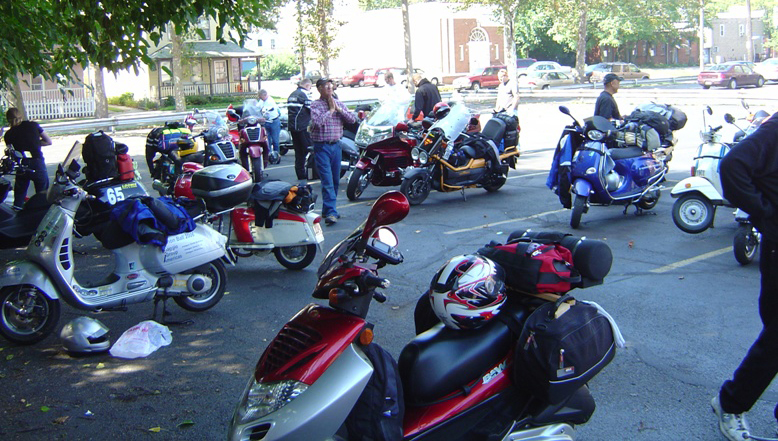

The third run of the Scooter Cannonball began on September 11, 2008, in San Francisco, California at Ocean Beach Park and concluded 10 days later in Ocean City, Maryland. The estimated distance of the route was 3,213 miles. Overnight locations included Lee Vining, California; Cedar City, Utah; Blanding, Utah; Salida, Colorado; Garden City, Kansas; Fort Scott, Kansas; St. Louis, Missouri; Cincinnati, Ohio; and Oakland, West Virginia.
The event, organized by Patrick Owens, refined the scoring and rules and established a foundational framework that largely exists in the event’s present-day format. The introduction of Google Street View and modernization of Google Maps with usable satellite imagery in 2007 allowed organizers to become more intentional with their checkpoint selections that defined the daily routes. The updates presented additional navigational complexities on lesser-traveled backroads, unpaved segments, and technical riding opportunities. These changes underscored the event’s motto of “it’s not a race” (or an endurance competition) but a time-distance, regularity rally in which riders are scored for miles completed along a navigationally and technically challenging route between defined locations. Another update involved reducing the class scoring system from four classes to three to align with the characteristics of entrant scooters. The remaining classes included Manual 200cc, Automatic 190cc, Automatic 250cc.
The Automatic 190 Class was won by Patrick Owens, riding a 2008 SYM HD200. The Automatic 250 Class was won by Jess Devine, riding a 2008 Vespa GTS. Of the 14 scooters in the Automatic 250 Class, 10 were manufactured by Vespa or Piaggio scooters and the remaining four were manufactured by Honda.
Related
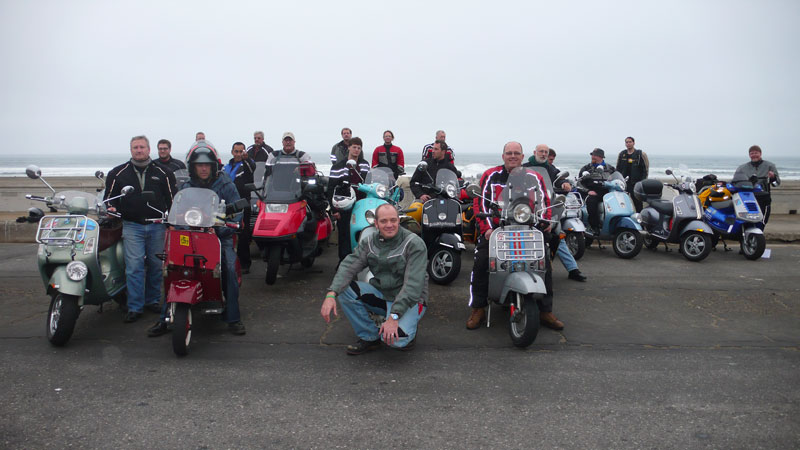

The 2010 Scooter Cannonball began on September 9, 2010, in Vancouver, British Columbia and concluded 10 days later in Portland, Maine. The official distance of the route was 3,487 miles. Overnight locations included Grand Forks, British Columbia; West Glacier, Montana; Harlowton, Montana; Bowman, North Dakota; Ortonville, Minnesota; Ironton, Michigan; Sault Ste. Marie, Ontario; North Bay, Ontario; and, Lake Placid, New York. The route required riders to complete three land border crossings between Canada and the United States and required riders to complete multiple unpaved segments through Montana and North Dakota.
The event was organized by two-time event veteran, Tom “Bagel” Donohue and adopted the same rules and scoring format as the prior year’s event. However, Donohue’s route checkpoint location list was specifically defined, whereas prior years mostly used landmarks or town squares as checkpoints. Donohue’s locations were identified as specific intersections or business establishments, and riders were expected to document their arrival at the defined location to receive points. The shift was considered a reasonable expectation for the time, with almost all riders using GPS devices on their scooters or carrying GPS-enabled smartphones. The 2010 rally was the third, and final, consecutive year that the event departed from the same (western) coast of the United States. Following 2010, the event formally began alternating between coasts going forward and no longer strictly used early-to-mid September as the recurring month.
A total of 22 riders, one vintage, and 21 modern scooters, participated in the 2010 Scooter Cannonball. Riding the vintage 1966 Lambretta SX 150, Starr Markham finished all 10 days of the event without the aid of a support vehicle and was the sole entrant in the Manual 200 Class. Matthew Benintendo, riding a 2008 Vespa LX 150, won the Automatic 190 Class, and Mark Anderson, riding a 2007 Piaggio MP3 250, won the Automatic 250 Class. Notably, two riders, Oscar “Oz” Lang and Arron Hiatt completed the event on 50cc scooters. Lang and Hiatt were predominantly featured alongside Lawson Clarke in the 2016 documentary, It’s Not a Race: The Scooter Cannonball Run.
Related
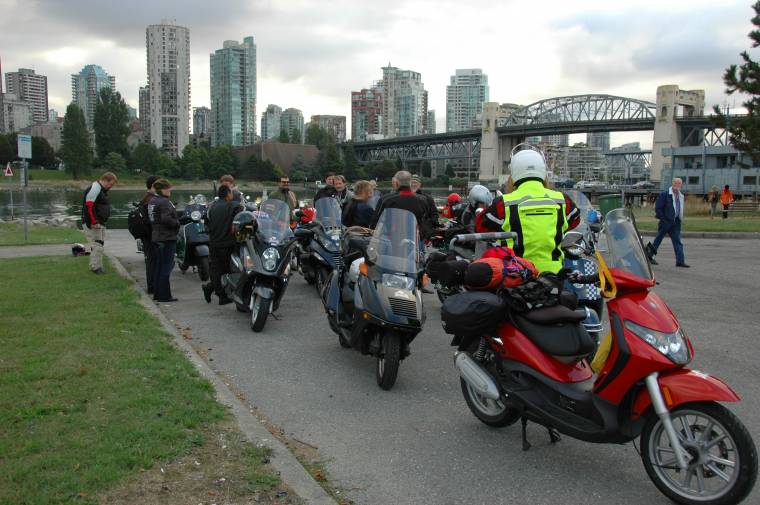

The 2012 Scooter Cannonball began on April 22, 2012, in Savannah, Georgia and concluded eight days later in San Diego, California. The approximate distance of the route was 2,588 miles. Overnight locations included Troy, Alabama; Hazlehurst, Mississippi; Lufkin, Texas; Abilene, Texas; Roswell, New Mexico; Show Low, Arizona; and Parker, Arizona.
Organized again by Patrick Owens, winner in the 2006 and 2008 Scooter Cannonballs and organizer of the 2008 rally, the 2012 event took on several changes. The route was designed to be attractive for vintage riders who were disinterested in the longer 2010 event. The shortest day was 306 miles and the longest was 362. There were two optional, unpaved sections in the official route, but they were bypassed by all participants.
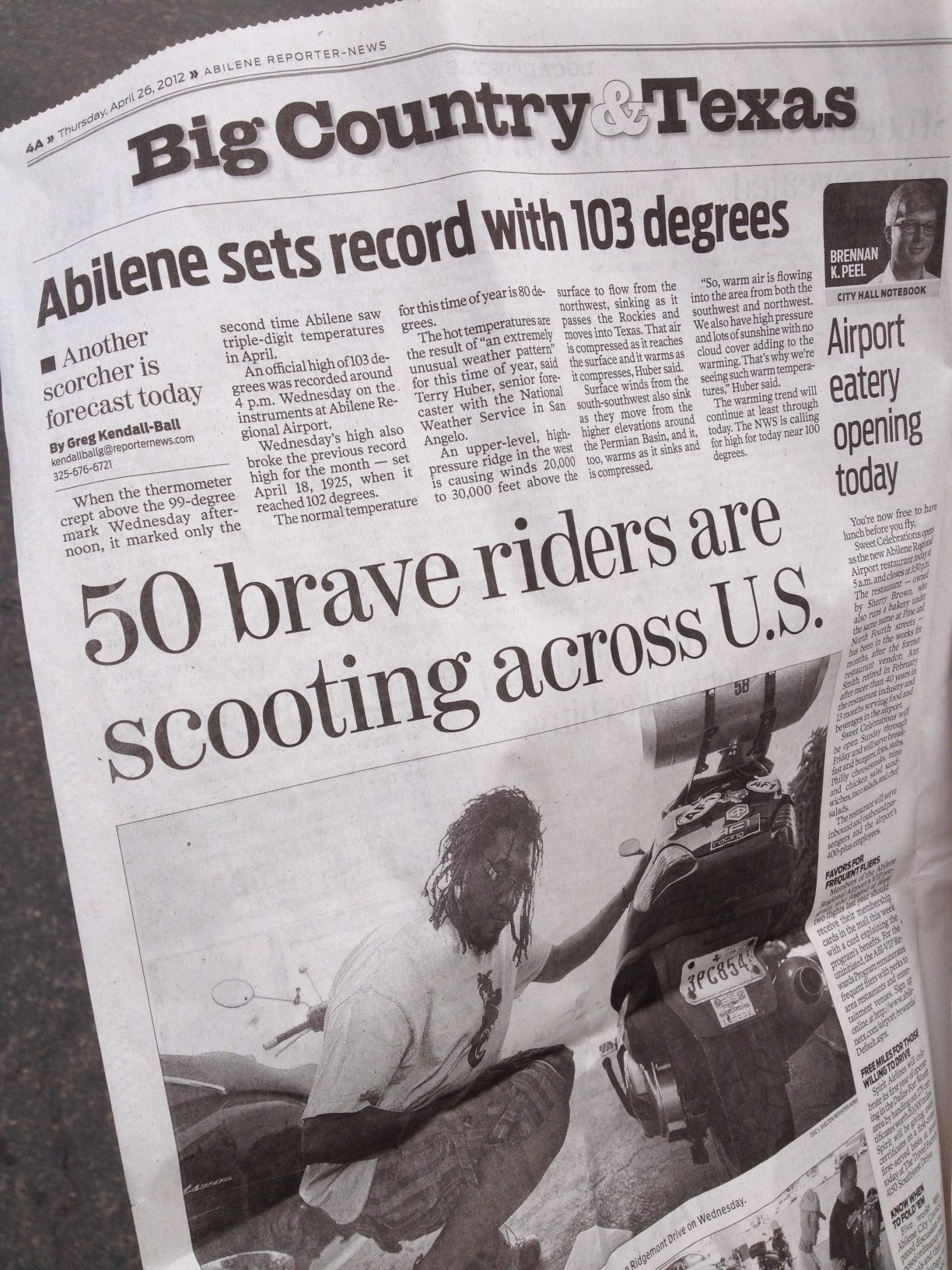
Declining participation among vintage scooters riders in the event left manual classes rather uncompetitive in 2008 and 2010. Scooter manufacturers began to discontinue 250cc model scooters in favor of slightly faster “300” series with 278cc engines. To address this, the 250cc maximum displacement restriction was lifted, provided the entrant bike still met three of the five definitions of a scooter. The class scoring system was also replaced by a handicap system. The handicap was introduced to normalize all scooters to a hypothetical late 1970s two-stroke scooter by factoring the engine year, displacement, and original year of the scooter’s frame. The handicap factor would be applied to the rider’s time during scoring and effectively penalize faster modern scooters capable of highway speeds while giving an advantage to older scooters or scooters with small engine displacement.
Approximately 85 riders registered for the event with a record 50 participants departing the starting line in Savannah and 48 riders posting scores on all eight days of the event. A total of 13 participants rode vintage scooters, while the remaining participants rode modern bikes. Half of the entrant’s rode scooters manufactured by Vespa or Piaggio with the remaining spread across Honda, SYM, Genuine, and Suzuki. Three entrants from the United Kingdom participated and finished the event riding loaner or dealer-sponsored scooters.
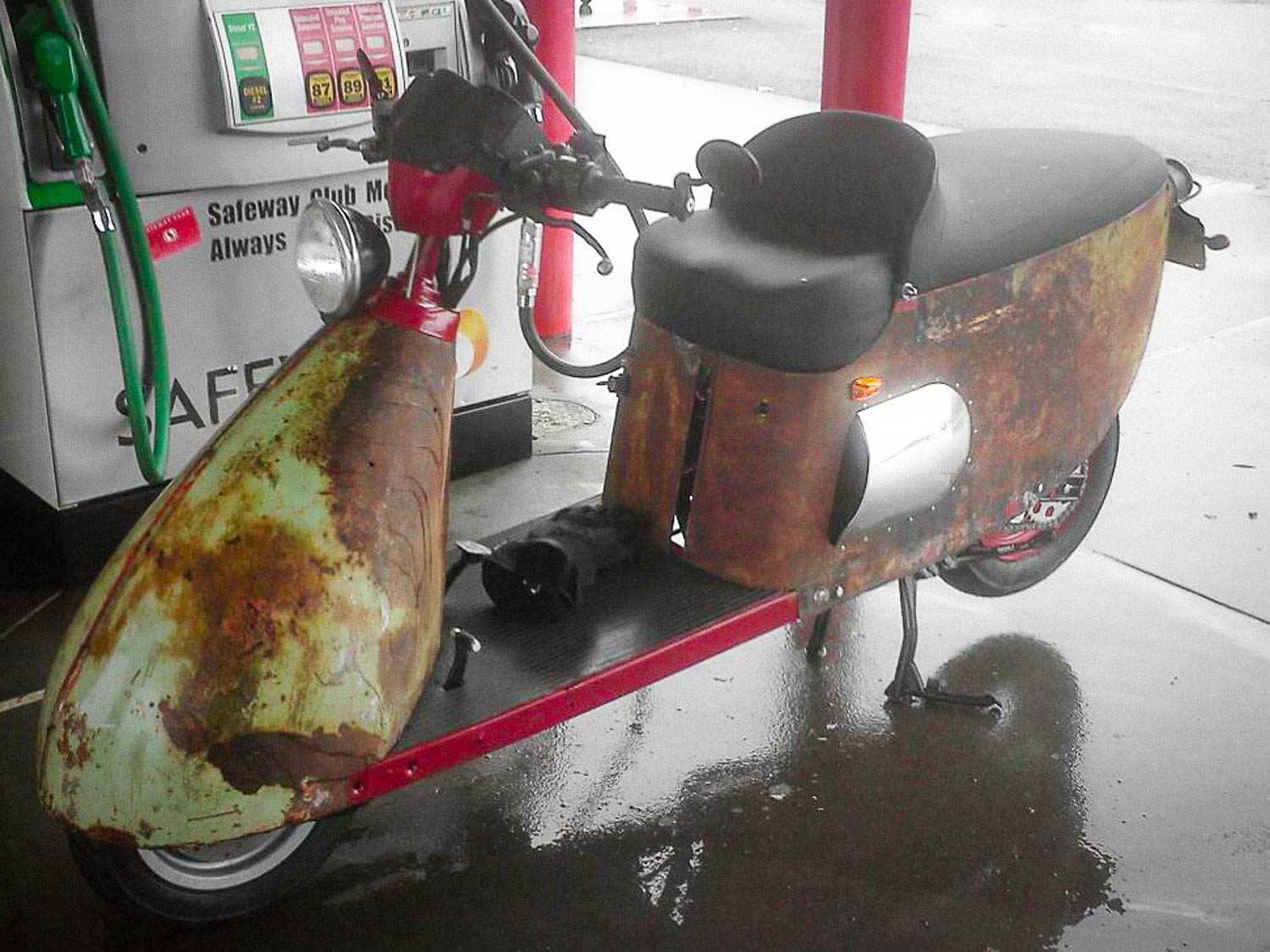
The overall winner was Lee Bryant, who successfully fabricated a 2000 Kawasaki Ninja 250a into the frame of a 1946 Salisbury 85. Under the newly implemented handicap formula, the combination of the newer engine’s performance and the 1946 frame made Bryant a mathematical outlier. Bryant completed all 10 days of the event on the modified Salisbury, riding much of the event under darkness and having to leave in the early morning to avoid overheating the engine enclosed in the Salisbury frame. To avoid future mathematical anomalies, the event would eventually update its rules to limit engine replacements to only those from scooters meeting the event’s definitions of a scooter. The second-place finisher, Phil Carey, rode a 1960 Sears Allstate, while Patrick Owens, riding a 2006 SYM HD200, finished third place.
Related


The 2014 Scooter Cannonball began on June 3, 2014, in Hyder, Alaska and concluded 10 days later in New Orleans, Louisiana. The approximate distance of the route was 3,611 miles. Overnight locations included Vanderhoof, British Columbia; Jasper, Alberta; Fernie, British Columbia; Helena, Montana; Pinedale, Wyoming; Dillon, Colorado; Ulysses, Kansas; Norman, Oklahoma; and, El Dorado, Arkansas.
The event was organized by three-time event veteran, Mark Anderson. Anderson kept the handicap system in place from 2012, making only minor changes to the rules to clarify intent. The route required riders to pass through two land border crossings between Canada and the United States, and it included multiple unpaved segments on multiple days in Canada, Montana, and Colorado. The route kept riders in mountainous or technical riding conditions for seven of the event’s 10 days. The early June time frame forced riders to ride through snow and ice conditions at higher elevations in Alberta, Canada, and Colorado, United States. The official finish line for the event was New Orleans, however, riders completed their final segment at the Abita Springs Brewery in Abita Springs, Louisiana. The final leg into New Orleans was ridden as a group ride, with several hundred scooterists joining in a parade route across the Lake Pontchartrain Causeway into downtown. The finish coincided with the 2014 Amerivespa Rally in New Orleans.
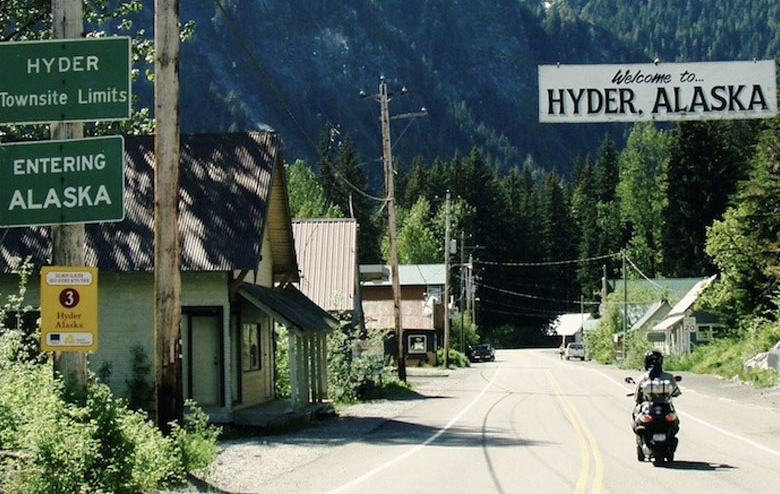
A total of 27 riders departed the starting line in Hyper, Alaska, and despite the route’s challenges, the rally had an unusually high finish rate. Twenty-two of the riders, including three vintage scooters, posted scores on nine of the 10 days, and 26 posted scores on eight of the 10 days. Piaggio again dominated the field with 20 scooters ridden under the brand’s umbrella, while the remaining participants predominantly rode Honda scooters. Binh Cheung, riding a 2010 Honda NHX 110, took first place in the event, followed by David Bednarski riding a 2007 Vespa GTS 250, and a Doug Hagemann riding a 2008 Aprilia Sport City.
Related


The 2016 Scooter Cannonball began on July 5, 2016, in Fernandina Beach, Florida and concluded 11 days later in Mukilteo, Washington. The official distance of the route was 3,704 miles. Overnight locations included Anderson, South Carolina; Lebanon, Tennessee; Jackson, Missouri; Nevada, Missouri; Lincoln, Nebraska; Valentine, Nebraska; Gillette, Wyoming; Livingston, Montana; Hamilton, Montana; and Walla Walla, Washington.
The event was again organized by Mark Anderson, who kept the rules and scoring format consistent with the prior year’s event. There were several unpaved sections in the official route, but most participants opted to bypass these areas for more favorable paved roads to reach the checkpoints. Although riders encountered heavy rain and tornado conditions through Tennessee and Missouri, weather conditions remained favorable for the remainder of the event.
A total of 34 riders, six vintage, and 28 modern scooters, departed the starting line in Fernandina Beach, Florida. Five of the vintage scooters and 23 of the modern scooters posted scores on all 11 days of the event. Among the participants, eight riders were members of Seattle’s "Soldiers of Destiny" scooter club. The riders were followed by a film crew who later released a comedic adventure documentary titled, “Slow Ride Home”. For the first time, the Piaggio umbrella of brands did not dominate the roster of scooters. Increased participation from older Honda Helix and Reflex models and the Yamaha Zuma and SMAX were well represented. Bob Monday, riding a 1986 Honda Helix, finished first place with a wide margin of victory. Walt Driggers, riding a 2015 Yamaha SMAX, finished in second place, followed by Bill Leuthold, riding a 2007 Vespa GT 200. There were no serious injuries sustained during the event.
Related


The 2018 Scooter Cannonball began on May 26, 2018, in Morro Bay, California and concluded 10 days later in Virginia Beach, Virginia. The official distance of the route was 3,900 miles. Overnight locations included Death Valley, California; St. George, Utah; Bluff, Utah; Trinidad, Colorado; Elk City, Oklahoma; Mena, Arkansas; Tupelo, Mississippi; Etowah, South Carolina; and Galax, Virginia.
With support from Mark Anderson, the event was organized by David Bednarski and Matthew Benintendo, both having completed four Scooter Cannonballs between 2008 and 2016. Frustrated by riders opting for faster or navigationally simplified route alternatives between checkpoints in 2016, and the reality that vintage participation would continue to drop, it was decided to introduce optional “bonus” checkpoint locations into the event’s format and to increase the overall mileage close to 4,000 miles. The optional bonus point locations allowed the organizers the ability to plan complex, daily routes that all but eliminated opportunities to travel on interstate highways and pulled riders even further from secondary roads to tertiary roads with frequent turns. Sections of the route also revisited more challenging portions of the 2008 Scooter Cannonball route through Utah. Five of the 10 days included unpaved segments with some loosely marked or unidentifiable without the aid of GPS equipment.
Approximately 55 riders registered for the event and 35 participants departed the starting line in Morro Bay, California. Of the 35 riders, 21 posted scores on all 10 days and finished the event. A single rider, Cynthia Wetzel O'Connor, rode and finished on a 1979 Vespa P200E. The remaining participants rode an equal mix of Piaggio, Honda, and Yamaha scooters. Scott Taggart, riding a 2008 Piaggio MP3 250, took first place in the event, followed by David Dennis, riding a 2009 Piaggio BV 250ie, and Walt Driggers, riding a 2015 Yamaha SMAX.
Related
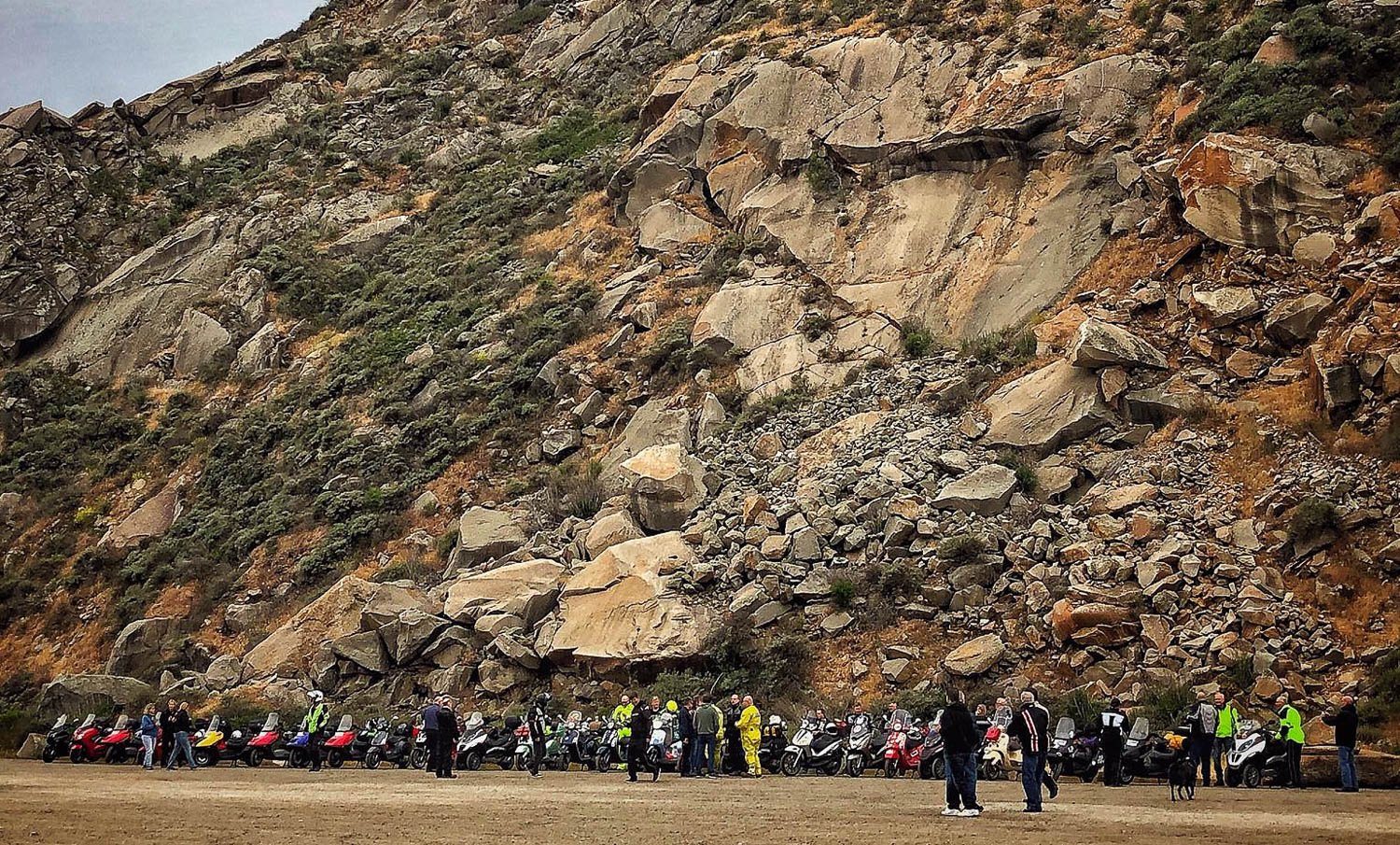
The 2020 Scooter Cannonball was scheduled to begin July 6, 2020, in Bar Harbor, Maine and conclude 10 days later in Eureka, California but was postponed due to the COVID-19 pandemic. The planned route was estimated to be 3,950 miles in length passing through Ontario, Canada between Niagara Falls, New York and Port Huron, Michigan. Overnight locations included Killington, Vermont; Niagara, Ontario; Gaylord, Michigan; Marshfield, Wisconsin; Huron, South Dakota; Hot Springs, South Dakota; Rock Springs, Wyoming; Delta, Utah; and Fernley, Nevada. Like 2018, the 2020 route was part tribute to the decade earlier event in 2010, shared many similarities in routing and border crossings, and included lengthy, unpaved sections in desolate areas of the country. At the time of the postponement in April 2020, 85 riders were registered for the event.

The 2020 Scooter Cannonball was rescheduled to begin July 12, 2021, in Bar Harbor, Maine and conclude 10 days later in Eureka, California. Due to the still closed Canadian and United States land border crossing, the original route was modified to bypass Ontario, Canada through northern Pennsylvania and Ohio. The revised route changed the overnight locations for the first three nights of the event and increased the total mileage by 500 miles, making the 2021 Scooter Cannonball the longest to date at 4,495 miles over 10 days. Overnight locations included Manchester, Vermont; Grove City, Pennsylvania; Traverse City, Michigan; Marshfield, Wisconsin; Huron, South Dakota; Hot Springs, South Dakota; Rock Springs, Wyoming; Delta, Utah; and Fernley, Nevada.
The event was organized by David Bednarski, who used the 2020 postponement as an opportunity to further refine the route’s road selection and develop a mobile phone app to modernize the rider tracking and scoring process. The plan for 2021 was to make an unassuming ride between Maine and California very challenging for riders of all skill levels. The revised route included approximately 225 miles of unpaved surfaces over eight of the 10 days.
For the first time since 2004, the event officially offered a breakdown support truck service available to riders as a fee-based service. A rented 16-foot box truck was operated by the event carrying spare tires and offering towing and rider transport service on a space-available basis. The event also partnered with MotoShippers, a point-to-point motorcycle shipping provider, offering riders an on-demand breakdown where their scooter could be retrieved from any of the overnight city locations and returned to their home for a fixed price fee.
A record total of 185 riders registered for the event between 2019 and 2021. Of the registered, 73 checked in at Bar Harbor, 65 posted scores, 37 posted scores on all 10 days of the event, and only 15 successfully navigated to and scored all 94 checkpoint locations. While not a favorite among competitors, the Piaggio brands dominated the field with 23 scooters, followed by Honda with 16 entrant scooters. Julie Taggart, wife of 2018 winner Scott Taggart, took first place riding a 2016 Yamaha SMAX. Second place went to 2014 winner, Binh Cheung, this time riding a 2019 Honda C125 Super Cub. Third place went to Robert Tucker, riding a 2002 Vespa ET4.
Related
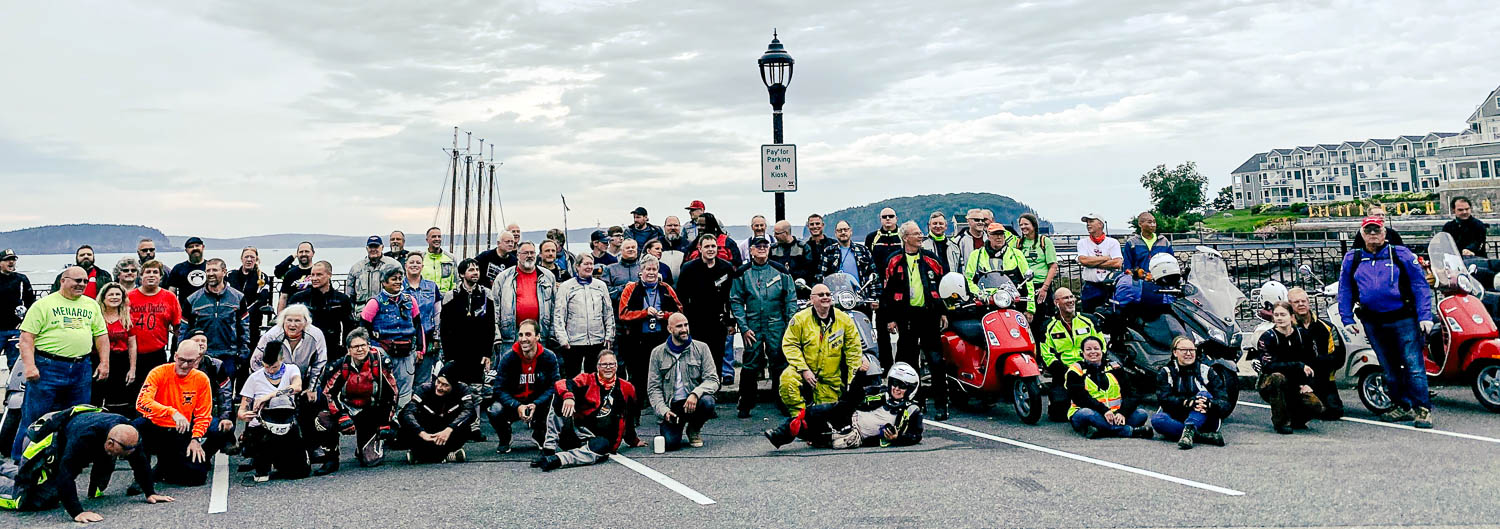

The 2023 Scooter Cannonball, marking its 10th iteration, took riders from San Clemente, California to Hilton Head, South Carolina, over the course of eight days starting on June 18. This event, revisiting the route from 2012, covered 3,175 miles, including about 60 miles on unpaved roads. The journey included stops in Lake Havasu and Winslow, Arizona; Los Alamos, New Mexico; Guymon and Miami, Oklahoma; Blytheville, Arkansas; and Rome, Georgia.
Organized by David Bednarski, with support from Scooter Cannonball alumni Doug Hagemann and Matthew Benintendo managing the support trucks, the rally relied on mobile app-based scoring without changing the existing rules. A record 287 riders registered, with 181 starting and 162 finishing the rally. The event continued to use a handicap-adjusted scoring system to determine its overall winner and divided riders into classes by scooter type to create class divisions for the first time since 2012. An experimental class was also permitted, including a separate scoring for bikes below 135cc that didn't meet the standard scooter criteria.
Riding a 2018 Yamaha SMax, Ben Aust from Minnesota clinched the overall win. Julie Taggart, winner of the 2021 event, not far behind, secured second place on her Yamaha 2020 SMax, with Gareth Waugh rounding out the top three on his 2014 Suzuki Burgman 200. Aust and Waugh were the respective winners of their class divisions. The remaining class victories included Monica Maltese winning the Small-bore class on a 2019 Honda Monkey, Cody Glugla taking the Automatic 125 Call on a 2021 Honda Super Cub, Dean Baker leading the Automatic 250 Class on a 2009 Vespa GTS, and Darin Rapko dominating the Automatic 278 Class on a 2012 Vespa GTS 300. Honda led the pack with 46 scooters, followed by Vespa with 39, and Yamaha with a total of 7 scooters.
Related
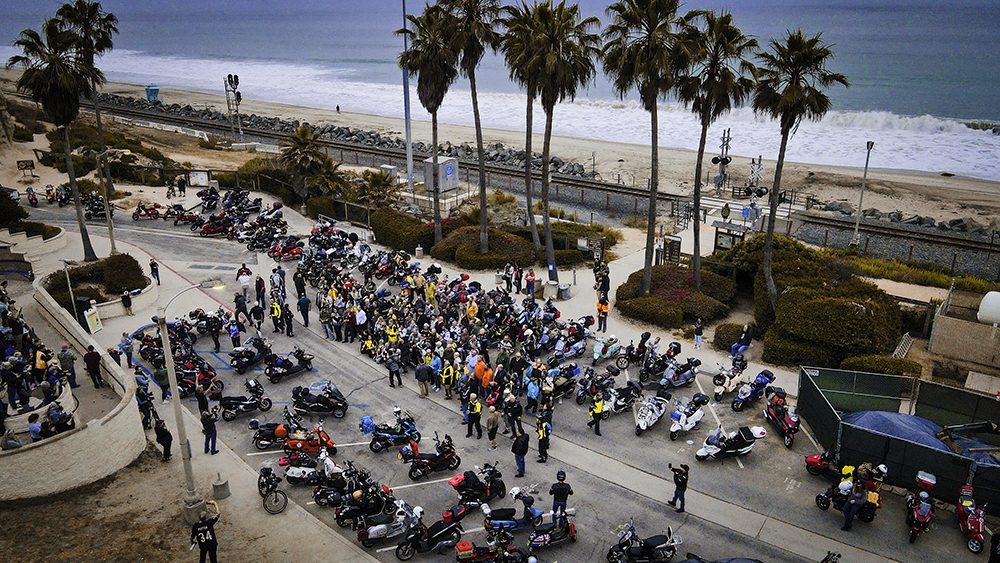
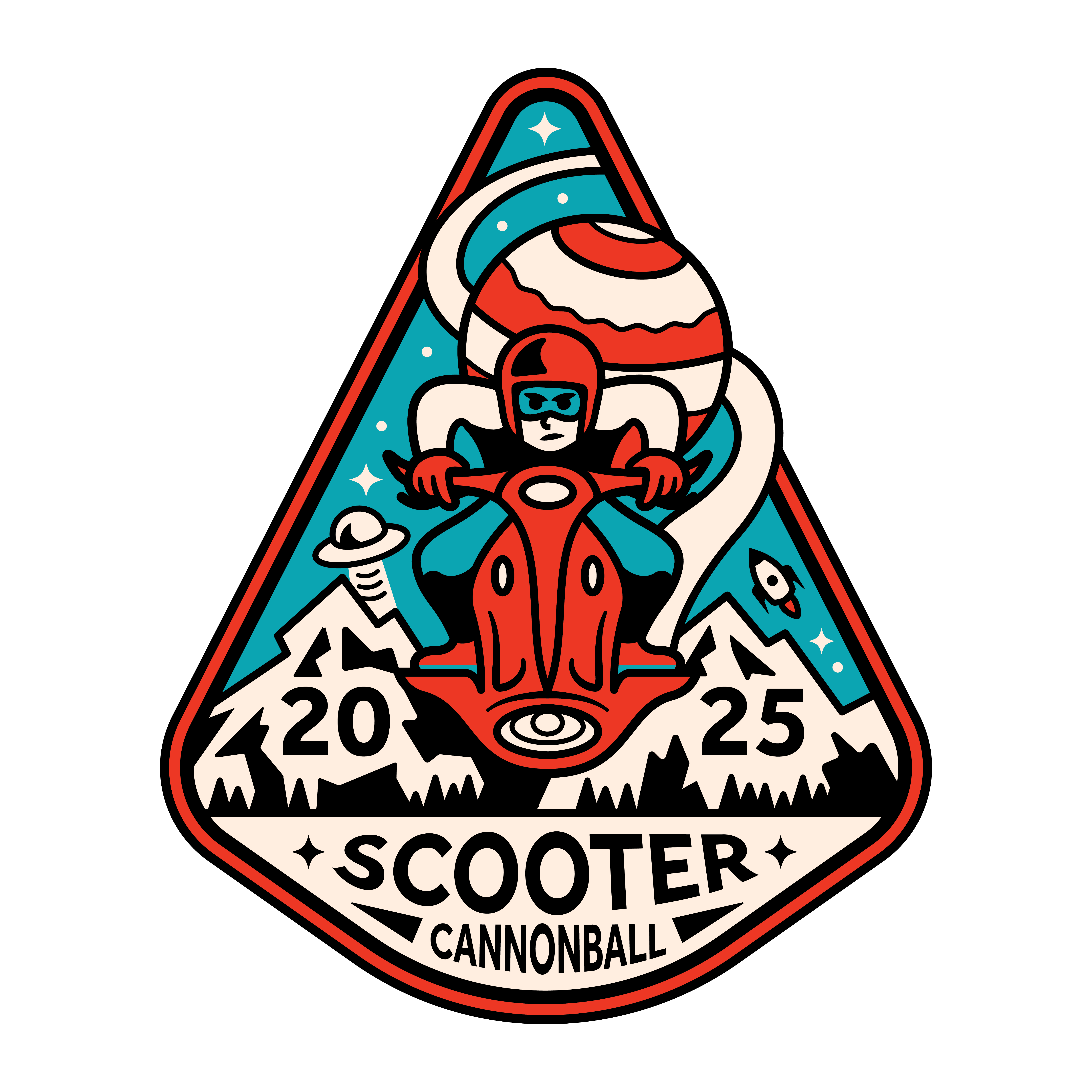
After the 2023 Scooter Cannonball, it was announced that the event would remain on the “odd years” and interested riders should mark their calendars for June/July 2025. Like previous years, the upcoming event would pay tribute to the route ridden a decade earlier, crossing the United States diagonally between the Pacific Northwest and the Gulf of Mexico. The 2025 Scooter Cannonball, the 11th running of the rally, is scheduled to begin June 22, 2025, in Seaside, Oregon and conclude eight days later in South Padre Island, Texas. However, breaking with tradition, the 2025 event will be the first to withhold the route’s checkpoint locations until the days before the event begins. The format, scoring, and rules will other remain consistent with prior event years using a handicap-adjusted scoring system and class divisions based on scooter type. Scooter eligibility has been expanded to include scooters with engines up to 300cc, and requirements bikes under 150cc have updated to accept old and new small-bore bikes not originally equipped with leg shields. The event will also continue to use a mobile app-based scoring system and offer a support truck service for riders. The 8-day event is expected to cover 3,400 miles of paved roads.
Most Finishes by Same Scooter & Rider:
Most Finishes by Rider (without support truck assistance):
Smallest Finishing Scooter (by displacement, without support truck assistance):
Oldest Finish Scooters (by displacement, original stock engine):
Best Coast-to-Coast Time (aggregate raw time, all days):
Oldest Finishers:
Youngest Participants: